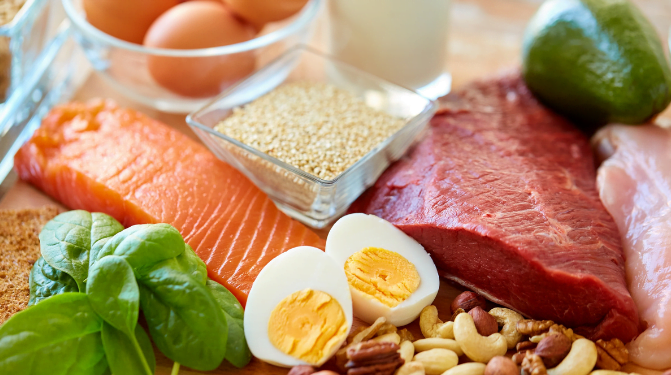Proteins are vital nutrients that our bodies require to function properly. They are composed of smaller units known as amino acids, which our bodies employ to construct and repair tissues.
Proteins are essential in practically every biological activity, including the development of muscles, skin, hair, and nails. They also help to produce enzymes and hormones, which govern a variety of bodily activities.
Why Are Proteins Important?
- Growth and Repair: Proteins play an important role in tissue growth and repair. This is especially crucial for children, teenagers, and expectant mothers.
- Enzyme Production: Enzymes are proteins that speed up chemical reactions in the body, such as digestion.
- Hormone Regulation: Some hormones are proteins that serve to regulate bodily functions such as metabolism and cell function.
- Immune Function: A healthy immune system relies heavily on proteins. Antibodies, which combat infections, are proteins.
- Energy Source: While carbohydrates and lipids are the body’s main energy sources, proteins can also give energy when necessary.
Foods Rich in Protein
To ensure you get enough protein, include a variety of protein-rich foods in your diet. Here are some examples:
- Meat and poultry: Chicken, cattle, hog, and turkey are excellent protein sources. They supply all of the critical amino acids your body need.
- Fish and seafood: Fish such as salmon, tuna, and cod are high in protein and contain omega-3 fatty acids, which are beneficial to heart health.
- Eggs: Eggs are one of the most complete protein sources, including all essential amino acids in the appropriate quantities.
- Dairy Products: Milk, cheese, and yogurt are high in protein and calcium, both of which are beneficial to bone health.
- Legumes:Legumes such as beans, lentils, chickpeas, and peas are high-protein plant foods. They are also rich in fiber and other vital minerals.
- Nuts and seeds: Almonds, peanuts, sunflower seeds, and chia seeds are high in protein and healthful fat.
- Soy Products: Soy products such as tofu, tempeh, and edamame are high in plant protein.
- Whole Grains: Quinoa, bulgur, and barley contain more protein than other grains such as rice or wheat.
Health Benefits of Proteins
- Muscle Maintenance and Growth: Protein is essential for building and maintaining muscle mass. This is especially important for athletes and people who exercise regularly.
- Weight Management: Protein can help with weight loss and management by increasing feelings of fullness, reducing hunger, and boosting metabolism.
- Bone Health: Adequate protein intake supports bone health and can reduce the risk of osteoporosis, especially in older adults.
- Healthy Aging: Protein helps maintain muscle mass and strength as we age, reducing the risk of sarcopenia (age-related muscle loss).
- Blood Sugar Control: Protein can help stabilize blood sugar levels, which is beneficial for people with diabetes or those at risk of developing it.
- Wound Healing: Protein is crucial for the body’s ability to heal wounds and recover from injuries or surgeries.
How Much Protein Do You Need?
The amount of protein required varies depending on age, gender, physical activity level, and overall health. On average, adults should consume at least 0.8 grams of protein per kilogram of body weight every day.
A person weighing 70 kg (154 lbs) should consume approximately 56 grams of protein each day. Athletes, pregnant ladies, and older folks may need more.
To summarize, proteins are essential for sustaining good health and supporting many biological activities. By including a range of protein-rich foods in your diet, you can ensure that your body receives the nutrients it requires to thrive.
Remember that a balanced diet with an adequate amount of protein will help you improve your health and well-being.
ALSO READ: Power of Vitamin A In The Body












